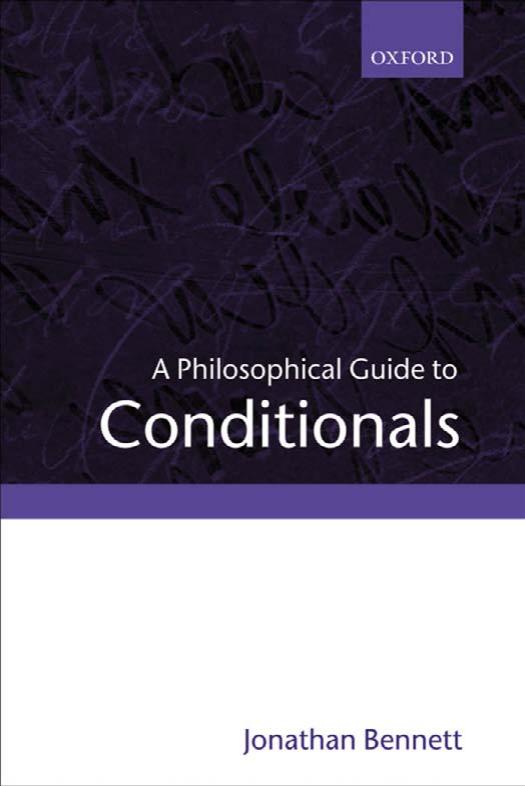A Philosophical Guide to Conditionals by Jonathan Bennett

Author:Jonathan Bennett [Bennett, Jonathan]
Language: eng
Format: epub, pdf
ISBN: 0199258872
end p.191
Happily, although this drops Lewis's account of what A > m C means, it does not deprive him of his 'might'-using argument against CEM. The argument still stands, because on any reasonable understanding of subjunctive conditionals A > M(C) will be true in exactly the cases where ¬ (A > ¬ C) is true. Thus, my definition and Lewis's are equivalent, and any argument supporting either will support the other. Or perhaps these are really one definition, not two. Perhaps, that is, Lewis's definition does not—despite appearances—treat 'If . . . might . . . ' as an idiom, and I have merely reworded it so as to make this fact plain.
Lewis would not have agreed with this, however, for he implicitly rejected my account (1973b:80-1). He refuted the view that A > m C means A > Possibly-C where 'possibly' expresses mere logical possibility. On this view, he pointed out, it could be true that If I had looked in my pocket, I might have found a penny there even if in fact there was no penny there; because it is not logically or absolutely impossible that one should find a penny in a certain pocket that is in fact empty. So far, I agree. But then Lewis continued: 'Nor would it help to exchange the outer possibility operator . . . for some other sort of possibility, since the contingencies I have noted persist for other sorts of possibility also.' I am not sure what he had in mind; but the contingencies in question do not, I submit, persist for the possibility operator I express with 'M', so that Look > M(find) is false. If the closest worlds at which I look in my pocket are ones at which M(I find a penny there), then at those worlds there is a penny in my pocket, or a real chance that a penny enters my pocket before I look, or the like; in which case Look > mFind is not plainly false.
Stalnaker holds that Lewis's and my accounts of 'might' subjunctives conflict with certain firm intuitions people have. (I am here guided by his 1984:144-5, and by personal communications.) Consider these two: (1)
I deny that if he were to compete, he would win, though I accept that if he were to compete, he might win.
Download
A Philosophical Guide to Conditionals by Jonathan Bennett.pdf
This site does not store any files on its server. We only index and link to content provided by other sites. Please contact the content providers to delete copyright contents if any and email us, we'll remove relevant links or contents immediately.
Cecilia; Or, Memoirs of an Heiress — Volume 1 by Fanny Burney(32549)
Cecilia; Or, Memoirs of an Heiress — Volume 2 by Fanny Burney(31948)
Cecilia; Or, Memoirs of an Heiress — Volume 3 by Fanny Burney(31932)
The Lost Art of Listening by Michael P. Nichols(7494)
Asking the Right Questions: A Guide to Critical Thinking by M. Neil Browne & Stuart M. Keeley(5762)
We Need to Talk by Celeste Headlee(5608)
On Writing A Memoir of the Craft by Stephen King(4936)
Dialogue by Robert McKee(4389)
Pre-Suasion: A Revolutionary Way to Influence and Persuade by Robert Cialdini(4224)
I Have Something to Say: Mastering the Art of Public Speaking in an Age of Disconnection by John Bowe(3880)
Elements of Style 2017 by Richard De A'Morelli(3343)
The Book of Human Emotions by Tiffany Watt Smith(3304)
Fluent Forever: How to Learn Any Language Fast and Never Forget It by Gabriel Wyner(3079)
Name Book, The: Over 10,000 Names--Their Meanings, Origins, and Spiritual Significance by Astoria Dorothy(2982)
Good Humor, Bad Taste: A Sociology of the Joke by Kuipers Giselinde(2945)
Why I Write by George Orwell(2945)
The Art Of Deception by Kevin Mitnick(2797)
The Grammaring Guide to English Grammar with Exercises by Péter Simon(2741)
Ancient Worlds by Michael Scott(2682)
